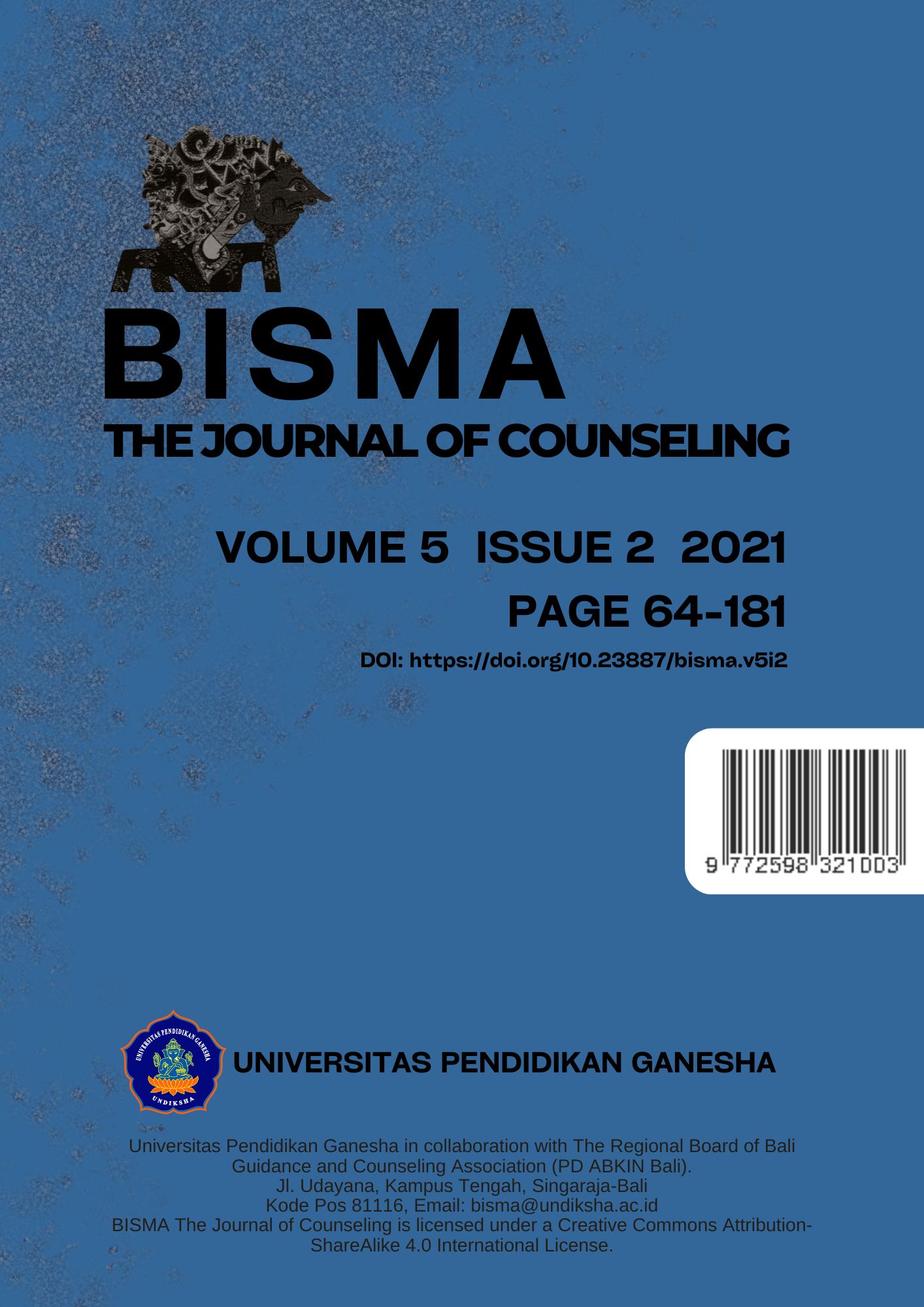What Motivates Parents to Participate in Their Child’s Brain Gym Therapy
DOI:
https://doi.org/10.23887/bisma.v5i2.40142Keywords:
child therapy, parent motivation, participation in therapyAbstract
The findings in the clinical practice field indicate problems related to the inconsistency of parental participation in the therapy that the child undergoes, namely the absence of parents according to the schedule, non-adherence to the therapist's advice, and premature termination. It raises questions of parents' motivation to participate in their children's therapy while no research in Indonesia examines this topic. The current study aims to understand the description of parents' motivation to participate in their child therapy. This qualitative study was conducted by interviewing 3 mothers (age 23-36 years) whose children (age 3-5 years) undergo brain gym therapy at a psychology bureau in Bandung. They are from the same socioeconomic class, have joined the therapy program for at least one month, and were selected using the purposive sampling technique. The results indicate that the underlying motivation for parental participation in child therapy is parents' need for a change in the child's condition and parents' expectation of the therapeutic outcome. Therapy results that match expectations and positive responses from the environment act as reinforcers that make parents willing to continue participating in child therapy.References
Ananda, Y. (2016). Hubungan Pengetahuan dan Motivasi dengan Keterlibatan Orang Tua dalam Terapi Perilaku pada Anak Autis di SLB YPPA Padang Tahun 2016. The Shine Cahaya Dunia S-1 Keperawatan, 1(1).
Anwar, S., Wihastuti, T. A., & Suharsono, T. (2014). Hubungan Tingkat Pengetahuan Tentang Program Terapi Metadon dengan Tingkat Motivasi Mengikuti Program Terapi Rumatan Metadon pada Pengguna Narkoba Suntik di Puskesmas Kecamatan Grogol Petamburan Jakarta Barat. Majalah Kesehatan FKUB, 1(1), 24–38. Retrieved from http://majalahfk.ub.ac.id/index.php/mkfkub/article/viewFile/20/17%0Ahttp://majalahfk.ub.ac.id/index.php/mkfkub/article/view/20/17
Aryanti, Y. (2015). Motivasi Orang Tua Memasukkan Anaknya ke Taman Kanak-Kanak. Universitas Pendidikan Indonesia.
Asmika, Andarini, S., & Rahayu, R. P. (2006). Hubungan Motivasi Orangtua Untuk Mencapai Kesembuhan Anak dengan Tingkat Pengetahuan Tentang Penanganan Anak Penyandang Autisme dan Spektrumnya. Jurnal Kedokteran Brawijaya, 22(2), 90–94. https://doi.org/10.21776/ub.jkb.2006.022.02.6
Becker, K. D., Lee, B. R., Daleiden, E. L., Lindsey, M., Brandt, N. E., & Chorpita, B. F. (2015). The Common Elements of Engagement in Children’s Mental Health Services: Which Elements for Which Outcomes? Journal of Clinical Child and Adolescent Psychology, 44(1), 30–43. https://doi.org/10.1080/15374416.2013.814543
Centers for Disease Control and Prevention. (2019). Data & Statistics on Children’s Mental Health. Retrieved April 19, 2019, from https://www.cdc.gov/childrensmentalhealth/data.html
Drieschner, K. H., Lammers, S. M. M., & Van Der Staak, C. P. F. (2004). Treatment motivation: An attempt for clarification of an ambiguous concept. Clinical Psychology Review, 23(8), 1115–1137. https://doi.org/10.1016/j.cpr.2003.09.003
Fitriani, A. (2020). Fenomena Kesehatan Perkembangan Seksual dan Peran Orang Tua Mild Retardation dalam Pendidikan Seks. Psychopedia Jurnal Psikologi Universitas Buana Perjuangan, 5(1), 28–46. https://doi.org/10.36805/psychopedia.v5i1.1004
Gill, L., Cassia, F., Cameron, I., Kurrle, S., Lord, S., Fairhall, N., … Langron, C. (2014). Exploring client adherence factors related to clinical outcomes. Australasian Marketing Journal, 22(3), 197–204. https://doi.org/https://doi.org/10.1016/j.ausmj.2014.08.006
Gordan, M., & Krishanan, I. A. (2014). A Review of B. F. Skinner’s ’Reinforcement Theory of Motivation. International Journal of Research in Education Methodology, 5(3), 680–688.
Kazdin, A. E., Holland, L., & Crowley, M. (1997). Family experience of barriers to treatment and premature termination from child therapy. Journal of Consulting and Clinical Psychology, 65(3), 453–463. https://doi.org/10.1037/0022-006X.65.3.453
Koran Jakarta. (2017, December 31). 50 Persen Anak Mengalami Gangguan Mental. Retrieved from http://www.koran-jakarta.com/50-persen-anak-mengalami-gangguan-mental/
Krause, M. S. (1966). A cognitive theory of motivation for treatment. Journal of General Psychology, 75(1), 9–19. https://doi.org/10.1080/00221309.1966.9710345
Lee, P., Zehgeer, A., Ginsburg, G., McCracken, J., Keeton, C., PC, K., … Compton, S. (2019). Child and Adolescent Adherence With Cognitive Behavioral Therapy for Anxiety: Predictors and Associations With Outcomes. Journal of Clinical Child and Adolescent Psychology, 48(sup1), S215–S226. https://doi.org/10.1080/15374416.2017.1310046
Mash, E. J., & Wolfe, D. A. (2016). Abnormal Child Psychology (6th Editio). Boston: Cengage Learning. https://doi.org/10.4324/9780203893258
Miltenberger, R. G. (2016). Behavior Modification: Principles and Procedures (Sixth Edit). Boston: Cengage Learning.
Nock, M. K., & Ferriter, C. (2005). Parent Management of Attendance and Adherence in Child and Adolescent Therapy : A Conceptual and Empirical Review. Clinical Child and Family Psychology Review, 8(2). https://doi.org/10.1007/s10567-005-4753-0
Nock, M. K., & Photos, V. (2006). Parent Motivation to Participate in Treatment : Assessment and Prediction of Subsequent Participation. Journal of Child and Family Studies, 15(3), 345–358. https://doi.org/10.1007/s10826-006-9022-4
Nudin, M. I., Abdurakhman, O., & Indra, S. (2020). Motivasi Orang Tua Memilih Pesantren Sebagai Sarana Pendidikan. E-Journal Skripsi: Fakultas Keguruan Dan Ilmu Pendidikan, 3(1), 14–27.
Pellerin, K., Costa, N., Weems, C., & Dalton, R. (2010). An examination of treatment completers and non-completers at a child and adolescent community mental health clinic. Community Mental Health Journal, 46(3), 273–281. https://doi.org/10.1007/S10597-009-9285-5
Reich, H., Bockel, L., & Mewes, R. (2015). Motivation for Psychotherapy and Illness Beliefs in Turkish Immigrant Inpatients in Germany: Results of a Cultural Comparison Study. Journal of Racial and Ethnic Health Disparities, 2(1), 112–123. https://doi.org/10.1007/S40615-014-0054-Y
Vroom, V. H. (1964). Work and motivation. Wiley.
Wierzbicki, M., & Pekarik, G. (1993). A Meta-Analysis of Psychotherapy Dropout. Professional Psychology: Research and Practice, 24(2), 190–195. https://doi.org/10.1037/0735-7028.24.2.190









